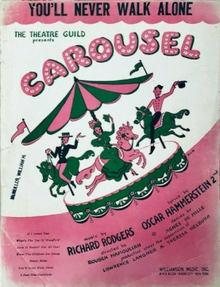
Back لن تسير لوحدك أبدا Arabic You'll Never Walk Alone Bulgarian You'll Never Walk Alone Breton You'll Never Walk Alone Catalan You'll Never Walk Alone Czech You’ll Never Walk Alone German You'll Never Walk Alone Greek You'll Never Walk Alone Spanish You'll Never Walk Alone Basque تو هیچگاه تنها گام برنخواهی داشت Persian
| "You'll Never Walk Alone" | |
|---|---|
 c. mid-1940s US sheet music | |
| Song | |
| Published | 1945 |
| Genre | Show tune,Operatic pop |
| Composer(s) | Richard Rodgers |
| Lyricist(s) | Oscar Hammerstein II |
"You'll Never Walk Alone" is a show tune from the 1945 Rodgers and Hammerstein musical Carousel. In the second act of the musical, Nettie Fowler, the cousin of the protagonist Julie Jordan, sings "You'll Never Walk Alone" to comfort and encourage Julie when her husband, Billy Bigelow, the male lead, stabs himself with a knife whilst trying to run away after attempting a robbery with his mate Jigger and dies in her arms. The song is reprised as an epilogue in the final scene to encourage a graduation class of which Louise (Billy and Julie's daughter) is a member as the Starkeeper is about to give them a graduation sermon. The now invisible Billy, who has been granted the chance to return to Earth for one day in order to redeem himself, watches the ceremony and at the end of the Starkeeper's homily is able to silently motivate Louise and Julie to join in with the song as the whole congregation unite in singing along with them urged on by the Starkeeper as he ascends to paradise.
The song is also sung at association football clubs around the world, where it is performed by a massed chorus of supporters on match day; this tradition developed at Liverpool F.C. after the chart success of the 1963 single of the song by the local Liverpool group Gerry and the Pacemakers.[1] In some areas of the United Kingdom and Europe, "You'll Never Walk Alone" became the anthem of support for medical staff, first responders, and those in quarantine during the COVID-19 pandemic.[2] The composition is sometimes treated by performers as a religious song, such as with the 1967 version by Elvis Presley, which was featured on several of his gospel albums.
- ^ Cite error: The named reference
Indywas invoked but never defined (see the help page). - ^ "The classic hits that are now coronavirus anthems". BBC News. March 27, 2020. Archived from the original on April 24, 2020. Retrieved March 27, 2020.